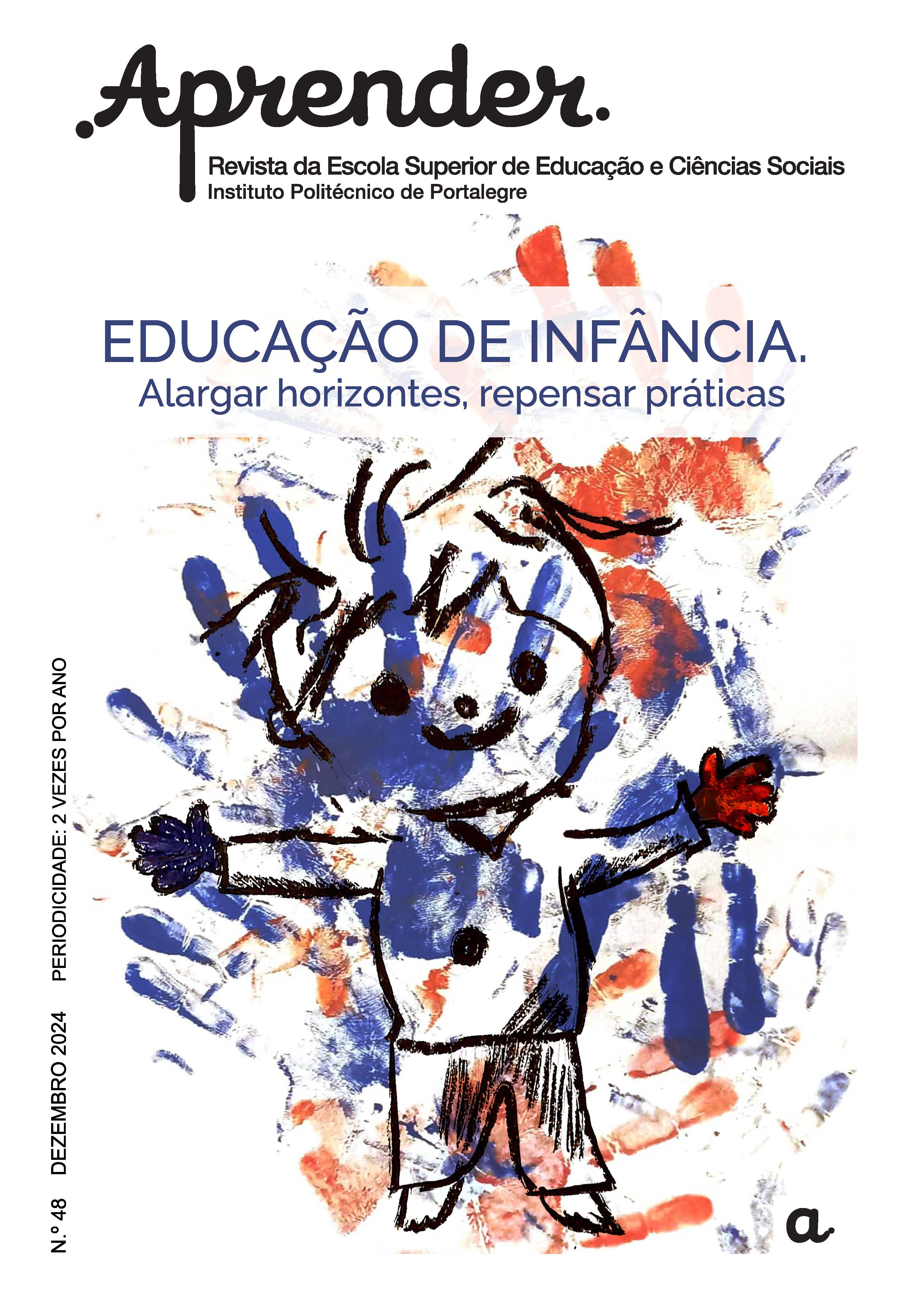“Look! This one looks like a mountain with a little bit of sea” - Social Dimensions of food
a look inside childhood
DOI:
https://doi.org/10.58041/aprender.216Keywords:
early childhood education, canteen, food, eating practices, childhood culturesAbstract
This work is the result of doctoral-level research that investigated feeding moments in the routine of early childhood education and sought to understand the ways in which children appropriate this space-time, directing a look at their actions, mediated by eating practices. The analyses are based on data generated in field research, carried out in the cafeteria of a public early childhood education unit, located in the city of Florianópolis, SC, Brazil. Participant observation and the detailed description of the relationships investigated, methodological procedures of ethnography, were the main instruments for generating research data. Practicing listening to the senses that circulate among children when they are at the table highlights the importance that the social and affective context of eating practices has for them. The research data are discussed in two parts: first, it addresses the ethical and methodological challenges of conducting research with children and, secondly, some episodes of the field research are presented, analysing them as indicators that inform early childhood education about the interactive and symbolic-affective aspects that affect children's eating practices. And, in general, they inform us about how their humanization process occurs, as a subject that is constituted in and by culture.
References
Agostinho, K. A. (2018). A escuta das crianças e a docência na educação infantil. Poiésis, 12(21), 154-166. https://doi.org/10.19177/prppge.v12e212018154-166
Agostinho, K. A. (2020). A docência na educação infantil e COM a participação das crianças. Espaço Pedagógico, 27(2), 375-388. https://doi.org/10.5335/rep.v27i2.11428
Alanen, L. (2001). Explorations in generational analysis. In L. Alanen & B. Mayall (Eds.), Conceptualizing child-adult relations (pp. 11-23). Routledge Falmer.
Alcock, S. (2007). Playing with rules around routines: Children making mealtimes meaningful and enjoyable. Early Years: An International Research Journal, 27(3), 281-293. https://doi.org/10.1080/09575140701594426
Bezerra, M. S. H. (2013). O espaço na educação infantil: A constituição do lugar da criança como indicador de qualidade [Dissertação de mestrado, Universidade Federal de Santa Catarina – Brasil]. https://repositorio.ufsc.br/handle/123456789/106910
Buss-Simão, M., & Lessa, J. S. (2023). Pesquisas etnográficas com crianças e adultas/os na educação infantil: Desafios éticos, conceituais e metodológicos. Revista Diálogo Educacional, 23(1), 341-364. https://doi.org/10.7213/1981-416X.23.076.DS14
Cohn, C. (2000). A criança indígena: A concepção Xikrin de infância e aprendizado [Dissertação de mestrado, Universidade do Estado de São Paulo – Brasil]. https://www.teses.usp.br/teses/disponiveis/8/8134/tde-15042024-142639/pt-br.php
Christensen, P., & Prout, A. (2002). Working with ethical symmetry in social research with children. Childhood, 9(4), 477-497. https://doi.org/10.1177/0907568202009004007
Christensen, P. (2004). Children’s participation in ethnographic research: Issues of power and representation. Children & Society, 18, 165-176. https://doi.org/10.1002/chi.823
Delalande, J. (2001). La cour de la récréation: Pour une anthropologie de l'enfance. Presses Universitaires de Rennes.
Echeverri, A. P. N. de. (2024). Conferência matinal. Colóquio Infâncias em contexto de emergência planetária: Desemparedamento e decolonialidade. Universidade Federal do Estado do Rio de Janeiro, Rio de Janeiro/RJ, 2-3 mai. 2024 [Conferência proferida].
Ferreira, M. (2004). Do “avesso” do brincar ou... As relações entre pares, as rotinas da cultura infantil e a construção da(s) ordem(ns) social(is) instituinte(s) das crianças no jardim-de-infância. In M. J. Sarmento & A. B. Cerisara (Orgs.), Crianças e miúdos: Perspectivas sociopedagógicas da infância e educação (pp. 55-105). ASA Editores.
Graue, E., & Walsh, D. (2003). Investigação etnográfica com crianças: Teorias, métodos e ética. Fundação Calouste Gulbenkian.
Hardman, C. (1973). Can there be an anthropology of children? Journal of the Anthropological Society of Oxford, 4(2), 85-99.
Kramer, S. (2007). A infância e sua singularidade. In Ensino fundamental de nove anos: Orientações para a inclusão da criança de seis anos de idade (2ª ed., pp. 13-24). FNDE, Estação Gráfica. https://journals.sagepub.com/doi/10.1177/0907568201008004006
Lessa, J. S. (2024). “Agora tu ficou com bem cara de nutri”: A conversão do olhar sobre os outros nas circunstâncias comuns da vida. In I. R. Valle (Org.), Miséria e sofrimento na educação brasileira (pp. 147-160). EDUFBA.
Lessa, J. S. (2019). Infância, educação e processos geracionais: Um estudo das relações e práticas do comer das crianças em um contexto público de educação infantil [Tese de doutorado, Universidade Federal de Santa Catarina - Brasil]. https://repositorio.ufsc.br/handle/123456789/204410
Lessa, J. S. (2011). O espaço alimentar e seu papel na socialização da infância: O caso de uma creche pública [Dissertação de mestrado, Universidade Federal de Santa Catarina - Brasil]. http://repositorio.ufsc.br/xmlui/handle/123456789/95440
Lessa, J. S., & Buss-Simão, M. (2021). Gênero e geração: Dimensões do cuidado nas relações educativas na educação infantil. Educação em Revista, 37(1), 1-19. https://doi.org/10.1590/0102-469825804
Lopes, J. J., & Vasconcellos, T. (2006). Geografia da infância: Territorialidades infantis. Currículo sem Fronteiras, 6(1), 103-127. http://www.curriculosemfronteiras.org/vol6iss1articles/lop_vasc.pdf
Santos, M. (1999). O dinheiro e o território. GEOgraphia, 1(1), 7-13. https://doi.org/10.22409/GEOgraphia1999.v1i1.a13360
Tassinari, A. (2007). Concepções indígenas de infância no Brasil. Tellus, 7(13), 11-25. https://www.tellus.ucdb.br/tellus/article/view/138
Vigotski, L. (2009). Imaginação e criação na infância: Ensaio psicológico. Ática.
Vigotski, L. S. (2000). A formação social da mente (6ª ed.). Martins Fontes.
Wallon, H. (2007). Afetividade e aprendizagem: Contribuições de Henry Wallon. Edições Loyola.
Downloads
Published
Issue
Section
License
Copyright (c) 2024 Juliana Lessa

This work is licensed under a Creative Commons Attribution 4.0 International License.







